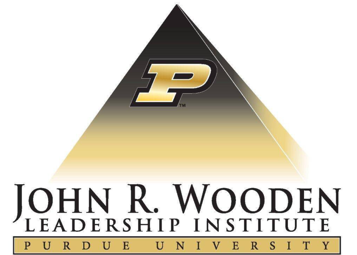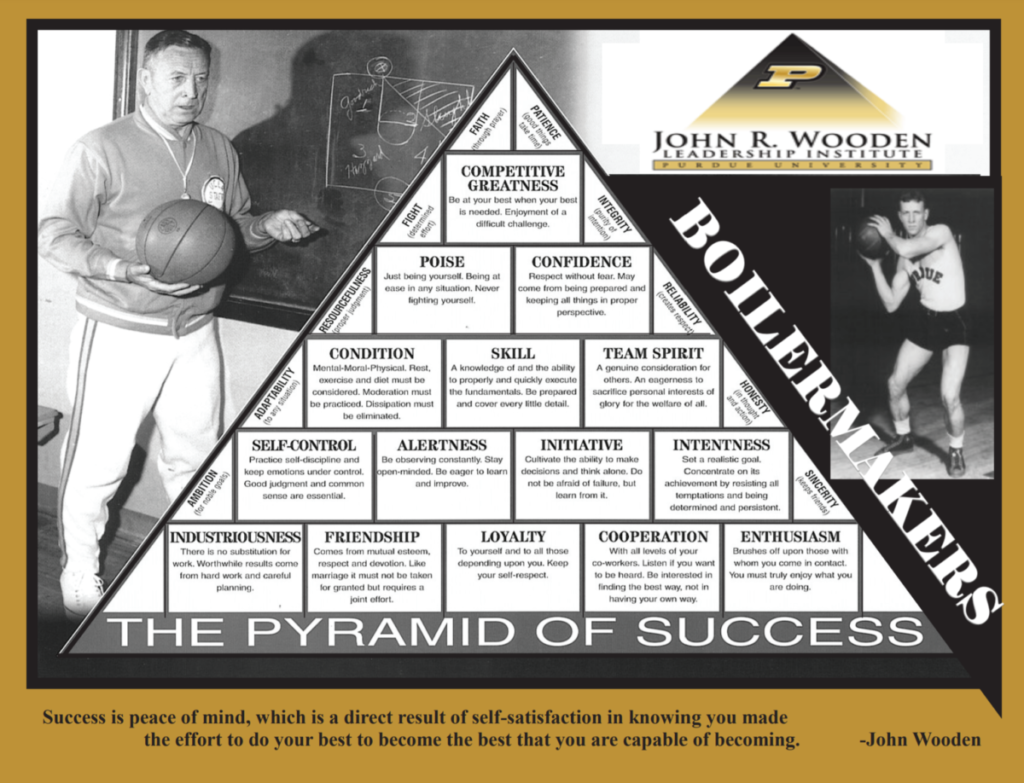Effective leadership needs to be practiced, tweaked, pondered, inspirational, motivational and, in my humble opinion, have the ability to bring people together.

In Jr. High School, I wrote a paper about growing up, going to college, and becoming a teacher and a swim coach. My dream also included being married and having children. After 30 years of coaching swimming and diving, (4 yrs. Age Group, 3 yrs. HS, 2 yrs. DI Asst Coach, 21 yrs. DI Head Coach at Purdue) I hung up my stop watch and 4:45am wake up calls and created and implemented the John R. Wooden Leadership Institute for the coaches and student-athletes of all 18 sports at Purdue University.
The year was 2008 and the millennials (and their parents) were causing a major shift/ruckus at colleges and in collegiate athletics. Parents were calling coaches and/or athletic directors to discuss not only playing time, but anything and everything under the sun; including personal relationships, their son’s/daughter’s feelings and mostly how the coaches were being unfair about many different issues. (My husband and I have two millennials, so all of this was insightful as a parent, coach, leadership advisor) I saw firsthand how the student-athlete was being pulled between pleasing his/her parents and pleasing the coach and buying in to the team culture. The result of this tug-a-war was anxiety, helplessness, and no understanding of self-awareness…. who they were and what they stood for? (Read “A Nation of Wimps” from Psychology Today to get a glimpse of a college student’s life.)
This was a challenging period. I remember having hard conversations with parents and student-athletes about the importance of roles when it comes to having a college student-athlete:
- Parents Role: To love their child unconditionally
- Student-Athletes Role: “Drive your own car” Be accountable/responsible for actions, words, behaviors, and communication.
- Coaches Role: To tap into the athletic potential and to teach life lessons comparing sport to life.
I sought out knowledge about characteristics of millennials and utilized all of Dr. Tim Elmore’s workshops and resources and shared those resources with parents and student-athletes.
Technology plays a huge role in the millennial and generation X characteristics. It is much easier to hide behind a computer/cell screen or post something on social media than it is to have a face to face hard conversation. (Adults are just as guilty.)
Now…. put the “over-parenting” with the “technology communication style” and then send the young adult off to college and it all makes perfect sense why we are seeing so much anxiety, binge drinking, self-medicating, transfers, fragility and even severe loneliness with our college students.
When I stepped down from coaching, my athletic director told me that he had just finished his performance evaluations with all of his head coaches and that every one of them had mentioned the lack of leadership qualities especially in their upperclassmen- the groups that usually lead the team, get voted captain and lead by example. (I had been telling him about the trend for 2 years) And that is the reasoning behind Purdue being one of the first universities to implement a leadership institution into their athletic department. When Coach John Wooden, a 1932 Purdue graduate, Academic and Athletic All-American and National Basketball Player of the Year, found out about the idea, he gave our athletic director permission to use his name, as long as we implemented his famous “Pyramid of Success” which focuses on 15 characteristics of leadership.

I am a huge believer that you cannot lead others if you do not know yourself. When I teach leadership, I always start with my theme of “DRIVE YOUR OWN CAR”, which literally describes getting out of the passenger seat of a car (HS) and moving into the driver’s seat (College). (Parents are still allowed in the car…. but they are now in the passenger’s seat or if overly controlling, they can sit in the back seat 😊) Next I introduce “ROAD MAP TO EFFECTIVE LEADERSHIP” which starts with one of my all-time favorite quotes from Marianne Williamson.
“Our deepest fear is not that we are inadequate. Our deepest fear is that we are powerful beyond measure. It is our light not our darkness that most frightens us. We ask ourselves, who am I to be brilliant, gorgeous, talented, and fabulous? Who are you not to be? And as we let our own light shine, we unconsciously give other people permission to do the same.”
I like to spend a lot of time on the next step “KNOW YOURSELF” I challenge the student-athletes to understand the following questions:
- What are my core values?
- What is my personal statement?
- What do I stand for?
- What is my “WHY”
- What are my strengths?
- What is holding me back?
During this phase of learning about leadership, I encourage journaling, reading insightful books, interviewing people who they admire, asking teammates point blank questions about what type of teammate they are and lastly, complete some type of behavior assessment. I am a certified behavior analyst and trained in the DISC Assessment so of course, I run the DISC on all my teams, coaches, administrators, and support staff. The assessment is an excellent tool to extrapolate valuable information such as strengths, liabilities, communication style, conflict management style, resilience, and risk management. (There are many assessments online that are free of charge) Before I begin to teach the next stage, I explain how the “KNOW YOURSELF” steps are a work in progress and could change frequently and should be looked at, re-evaluated and tweaked often. When people jump into leadership situations and opportunities without doing any work on self, it can be easy to take the wrong road, a short cut or get totally lost. The “KNOW YOURSELF” phase acts as a compass for effective leadership.
The next phase in teaching leadership is about expectations. I am a big believer in understanding the importance of expectations of any situation before you can become an effective leader. Here is a list of expectations coaches are looking for in their student-athletes.
QUALITIES COACHES EXPECT FROM LEADERS:
- Maintain motivation, have a passion for the sport and a desire to improve
- Ability to stand up (and standalone if necessary) to teammates about issues that will affect Team Results and be detrimental to Team Culture
- Support Coaches…loyalty to program
- Outstanding character…in and out of the water
- Composure…in pressure situations in and out of the water
- Low maintenance/Low drama…put out fires
- Has a will to WIN (be successful) and brings that quality out in teammates…the ability to “LEAD” a group to a common goal
- Confident & Resilient (failure and frustration lead to determination)
- Trusting (to teammates & coaches)
- Disciplined with GREAT Work Ethic (does not need to be stood over to do the right thing)
- Accountable and Self-Reflective…. a wiliness to be uncomfortable, if need to be, for the Team.
These expectations can be adjusted to families, businesses, groups, etc. These were the common expectations I collected working with all types of teams. If you notice, good communication skills are not on the list. It is just assumed that leaders will be good communicators. Again, I think that is why the “KNOW YOURSELF” phase is so valuable. What type of communicator are you? Are you an introvert or an extrovert? Both can be great leaders, and it is so valuable to know your communication style before you can live up to your coach’s (or your own) expectations.
Lastly, I have asked some college student-athletes to compile a list of tips to follow while working on improving your leadership skillsets. This is a great exercise for a group and creates insightful discussions.
TEN TIPS TO BEING AN EFFECTIVE LEADER
- An effective leader continually works and studies to improve. They understand leadership is a process.
- An effective leader cannot and will always not be liked by everyone and cannot worry about that.
- An effective leader has integrity.
- An effective leader creates trust.
- An effective leader is flexible and can adapt to their organization and other situations.
- An effective leader is a good innovator, communicator… (i.e. written and/or verbal skills, utilizing quotes, poems videos, music, literature, or guest speakers.
- An effective leader demonstrates confidence and yet is not afraid to be vulnerable.
- An effective leader is observant of those around them and is inclusive.
- An effective leader makes people feel part of the process.
- An effective leader puts service before self.
Leadership is Action, not Position. I believe not knowing one’s own leadership and communication style and thinking that leadership is not a verb are the biggest mistakes which hold people back from being effective leaders. I do not believe we have raised a nation of wimps. I think the Millennials and Generation Z have all the potential to lead not only America, but to create a better world. I absolutely love working with young adults and find their thirst for knowledge, independence, balance, justice, and leadership are such admirable characteristics and will lead us into tomorrow.

